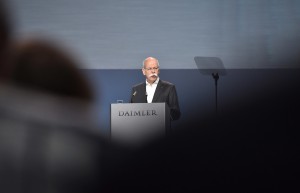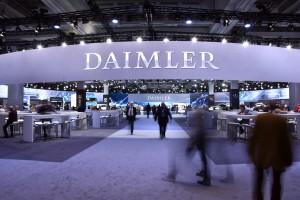
Daimler AG's Dieter Zetsche attempted to assuage concerns of investors about the future of diesel engines.
Daimler AG management insists the diesel engine has bright future, but the company’s shareholders are growing more skeptical and are raising questions about whether they should remain part of the company’s product portfolio in the face of stringent, new emission standards.
Shareholders, mainly representatives of investment funds holding shares of Daimler AG, raised questions about whether, in the aftermath of the scandal around the cheating on the emissions tests used by Volkswagen, it was wise for Daimler and Mercedes-Benz to continue investing in diesel technology.
The question, coming during a meeting in Germany from German shareholders, indicate how the fallout from the “Dieselgate” scandal continues to impact a technology that up until VW’s troubles emerged in 2015 was the pride of the German auto industry.
Daimler acknowledged in its annual report that the emission controls used on its diesel engines are the target of multiple investigation in Europe and North America where the U.S. Department of Justice, Environmental Protection Agency and California Air Resources Board.
(Daimler’s Zetsche talks about future with diesel. Click Here for the story.)
Bodo Uebber, Daimler chief financial officer, acknowledged in response to shareholders’ questions, that there is “greater insecurity” around diesel engines because of proposals to ban them in certain cities or regions. The insecurity has put pressure on the company’s portfolio of lease vehicles. “We’d adapt depreciation value as part of this assessment,” Uebber said.
Dieter Zetsche, Daimler CEO, defended the company’s continuing investment in diesel engines.
Daimler goal is to meet the demanding limits imposed by the EU on the emissions of carbon dioxide – 95 grams per kilometer — for 2021. “We have already flipped the switch by 2022 the entire portfolio of Mercedes-Benz will be electrified,” he said.
(Click Here for more about a German court ruling that could spell the end for diesel engines.)
“But state-of-the-art combustion engines are also helping to further reduce (carbon dioxide) emissions in road traffic. The diesel engine in particular is playing a major role here. It’s absolutely clear that we automakers are responsible for reconciling individual mobility with climate protection and clean air,” Zetsche said.
“That’s why I’d like to say three things about this top. First, we are making every effort to bring more facts and greater objectivity into discussion of the diesel engine,” Zetsche said in his speech at the opening of the meeting.
“Second, we’re placing our emphasis on innovation rather than driving prohibitions. We advocate technically practical and financially responsible way to further reduce the emissions of vehicles that are already owned by customers. The software updates we have announced for more than 3 million vehicles are an effective and comparatively quick solution.
(To see more about Mercedes’ new North American headquarters, Click Here.)
“Third we offer our customers state-of-the-art diesel vehicles,” he added. “By updating our model range, we will further reduce nitrogen oxide emissions. In the drive-system mix of the future, the high-tech diesel engine will not be part of the problem — it will be a key part of the solution,” he said.


In less prosperous regions of Europe, diesels may be 50 to 80% of automobiles. It costs less than gasoline there, and mileage is much better. A motor that can power the smaller cars as well as these little turbo diesels (MB’s is 1.4L) won’t be easy to find at the required price point.